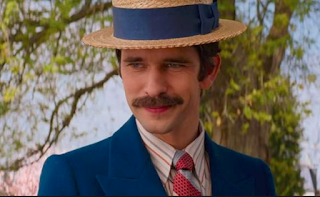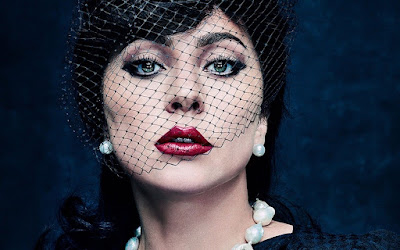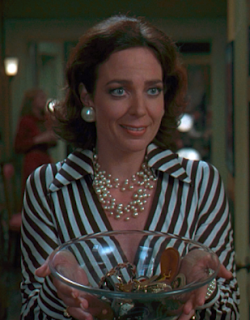Film Review: Mary Poppins Returns
There is an excellent fake trailer for the original Mary Poppins which teases it as a horror film – and it works because Julie Andrews as Mary Poppins is, among other qualities, terrifying. She has psychokinetic powers, she apparently controls the winds to ruthlessly blow away the nanny competition, she has a tricky doppelganger in the mirror – she is jealous, vain, and seemingly capable of anything. While she chooses to use her powers to help the Banks children, one feels that at any moment she could change her mind with the winds. There is tension in every moment on screen between the sweetness of Julie Andrews and the impish powers of her character -- between the beauty of her singing voice and the utter strangeness of the lyrics. As a result, the performance is electric – and deservedly Oscar-winning.
Julie Andrews, always the Dame, graciously refused the offered cameo in Mary Poppins Returns in order to allow Emily Blunt to shine on her own. And Blunt does shine – she’s great fun, speaking in a deep vocal register, narcissistic and showboating with false modesty, all-knowing and tricky and wise, just as Mary should be. There will never be another Julie Andrews, and Blunt's singing is merely good instead of divine, but she does her best, and while it's not Oscar-worthy, it works far better than I expected it to. This Mary is still Mary -- but also Emily's own. She is somehow a harsher, zanier Poppins in a safer, sweeter film -- and her touch of sourness is more than welcome in this otherwise sticky-sweet concoction of a movie.

I cannot say the same when comparing Lin-Manuel Miranda's "Jake" to Dick Van Dyke's "Bert." While "Trip A Little Light Fantastic" is one of the better numbers, it's still no Chim Chimney -- not by far, and now just hours after seeing the film, I can't remember the tune. While Jack's gaslamp-keeper occupation creates beautiful images and interesting thematic suggestions (after all, isn't Mary just gaslighting all of us with her imaginative adventures?), Miranda simply doesn't have the manic grace of his predecessor. His voice is Broadway-tuned and his manner is game, but when Dick Van Dyke makes his appearance at the end, jumping on a desk to do a little nonagenarian tap-dance, it oozes more soulfulness and elicits more chills than Miranda's entire youthful performance, eager-to-please as it is.

Meryl Streep as Mary's "Cousin Topsy" is perhaps a little forced, but contributes a zesty number nonetheless in "Turning Turtle," where the crew learns about changing one's point of view to gain enlightenment. There is a fun Streepian in-joke about the inability to place her character's Eastern European accent, which sounds like Sophie Zawistowski playing Dracula. But it's Streep's energy, combined with the detailed and creative set design, that makes the number work. When "Turning Turtle" is over, everything is upside down, and the beautiful scenery is chewed to bits. That's how it should be -- you don't cast Meryl Streep if you want otherwise.

The best performance in the film is Ben Whishaw as the grown widower Michael Banks. He’s a decent, loving man under tremendous stress as the bank threatens to repossess their home (Colin Firth is simply all right as a wolfish banker), and the most effective scene is one with no special effects but plenty of acting
magic, as he hits his breaking point and vents his frustration on his children and their controlled-chaos-strewing nanny. His performance helps to gel the story emotionally, so that while the enjoyable-but-not-catchy songs keep things unmemorably pleasurable throughout, he creates the conditions for a genuinely moving conclusion.
The climax, in which Mary battles with Big Ben to stop time, is unexpectedly epic and thematically fitting. Mary, as some sort of unaging trickster Goddess, is timeless -- in some mysterious way she represents the triumph of the eternal over the transitory. She sings knowingly to the children grieving their mother of some "place where lost things go" -- a place where the missing and the dead are present and eternal and Saturn's chronological powers end. It's oddly comforting of Mary Poppins -- typically her role is to unsettle and discombobulate -- but it makes sense that she would have knowledge of unseen realms, given she arrived from the clouds on a kite string. But with the final battle against time itself, Mary Poppins returns to remind a cynical world of nihilistic adults that imagination and belief is a power that transcends despair. She triggers the memories of adults who have forgotten the children's truth (and it is a truth) that just because something can't be seen, doesn't mean it isn't real. Perhaps some of you are such adults who believe themselves to be too clever to fall for magic "tricks" -- the ending of this film is for you.
If anyone can keep their eyes dry when Dick Van Dyke and Angela Lansbury appear at the end to nearly steal the show, I’m not sure what would manage to move them. The sound and sight of the legendary Angela Lansbury singing "Nowhere to Go But Up" as she hands out magic balloons is unexpectedly tear-jerking. It's gooey, sentimental, and sweet -- but it's all in, and it works. When Van Dyke and Lansbury arrive, you feel their hard-earned wisdom, and no matter how cynical many of us might have become in recent years (and the film is saying something about our hellish real-world conditions -- notice Emily Mortimer's 30s version of the pink pussy hat), they envelop us in heartbreaking nostalgia and gift us the saving grace at the bottom of Pandora's box of monsters: genuine hope. Indeed, in 2019, we've got nowhere to go but up. We hope.

Because as safe as Mary Poppins Returns plays most things, the one way in which this film truly transcends the original is in emotional impact -- made possible because of the memories of the first film, but a payoff that needed to be earned nonetheless. I did not expect this, and my tears took me by surprise. Mary Poppins Returns is, to its detriment, not the potential horror film of the original. It is not a better film than Mary Poppins, it is not a great film, and the score is not timeless – but this is a lovingly done tribute-sequel, and where Disney’s Force Awakens echoed Star Wars while leaving one cold, Mary Poppins Returns fills up your heart and floats you out of your seat. If only it left you humming as well.
-----------------------------------------------
I did not plan to give this many stars -- but I was successfully manipulated by a perfectly placed Angela Lansbury. 3.5 out of 5 stars.



Comments
Post a Comment